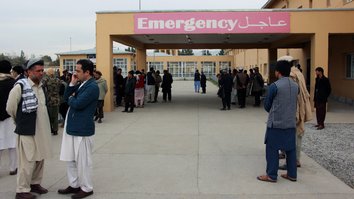SAMANGAN -- The United Nations' Food and Agriculture Organisation (FAO) is working to enable hundreds of women in Samangan to be self-sufficient and to support their families.
In co-operation with ActionAid and Samangan's Department of Agriculture, Irrigation and Livestock (DAIL), FAO has distributed vegetable seeds and home garden tools to 500 female farmers in Dara-e-Sof Payan and Dara-e-Sof Bala districts of Samangan, said Fazel Rahman Sayee, Samangan's DAIL spokesperson.
"Vegetable seeds and agricultural tools have been distributed to 250 women in Dara-e-Sof Payan and 250 women in Dara-e-Sof Bala," he said.
"Home gardening tools including shovels, sickles and ploughshares ... as well as cucumber, tomato, okra, pepper and lettuce seeds have been distributed among women," he said.
The income from harvesting and selling produce will help with the women's financial status while contributing more produce to the market, he added.
The objective of distributing these tools is to improve food security, to create jobs for women, and to strengthen their skills, Sayee said.
"With the distribution of these tools, women have become more self-sufficient and empowered. Their income will increase, and they will no longer need to depend on anyone,' said Sayed Ikram Omari, director of the Agriculture Department in Dara-e-Sof Payan.
"We are planning to engage other interested women in different fields of agriculture in the future," he added.
Rescuing families from poverty
Most of the female farmers say they lost their family's breadwinner amid conflict and war, and that the FAO initiative helps them meet the daily needs of their family members.
Masooda, 35, a farmer and mother of four in Dara-e-Sof Bala, said she lost her husband in the war in May 2020 and that she is now responsible for feeding her family.
"My life was destroyed when I lost my husband. I lost hope in the future and faced many problems."
"I am happy now that home gardens have been established for us and that we will be able to meet our daily needs," she added.
"What should women who do not have a male breadwinner do? How can they feed their family if they don't work?" she asked.
Samangan women are highly motivated to work and are hoping for more opportunities in the future, she said.
"We have 10 women on our team, and one greenhouse has been established for us. We cultivate vegetables using the seeds provided to us and then take care of them using the tools we have," said Rahima Ghafoori, 32, one of the project beneficiaries in Dara-e-Sof Payan.
"I used to be a schoolteacher, but I haven't had a job for the past eight months, so I turned to agriculture," she said.
"We are very happy that a respectable job has been provided for women and that we can earn a legitimate income and contribute to the greenery of our country," she added.
"We have the right to work outside our homes and earn a living," Ghafoori said, adding that women should not forget their hard work and should not stay at home.
Women stepping in as providers
With increasing unemployment among men and the loss of breadwinners in the war, women must now work for their families to survive, say Samangan residents.
"Hundreds of thousands of men have lost their lives in two decades of war and have left their families without a breadwinner," said Ghulam Rasool Rahimi, a resident of Samangan province.
"Women in those families have to work and earn a living for their families," Rahimi said.
"Working women face many challenges, but they will overcome these challenges and make a brighter future for themselves," he said.
"The more work opportunities women have, the better they can support the livelihood of their families and they can become financially independent," Rahimi said.
International organisations have been stepping in to help in the province.
A WFP pistachio initiative was also launched in Samangan in late May, creating 1,000 jobs for the residents.
The initiative, with a budget of more than 48 million AFN ($540,000) provided by the WFP, is being implemented with the co-operation of the Swedish Committee for Afghanistan in Samangan province.

![Dozens of women in Dar-e-Sof Payan district, Samangan province, receive vegetable seeds and home garden tools from the United Nations' Food and Agriculture Organisation (FAO) in co-operation with ActionAid agency on June 4. [Samangan Department of Agriculture, Irrigation and Livestock]](/cnmi_st/images/2022/06/27/35975-a-585_329.jpg)







Every action to save people's lives is appreciated, but the question is, have other jobs been finished, as now the United Nations is training Afghan women in agriculture? I am not saying that farming is a bad practice. I mean that the United Nations should also consider the cultural aspect of society. Afghan women work mostly inside their homes. Here, I mean the women of rural areas. I mean that the United Nations should train these Afghan women in such a way that they pay attention to the cultural aspect. Their personality should not be underestimated. In the past, some projects trained women in various fields, for example: raising chickens, weaving carpets, making handicrafts, and many more. It is necessary to pay serious attention to this aspect of Afghan women, their personalities should not be affected, and at the same time, they should get something to improve their lives.
Reply2 Comment
Woman is a delicate human being. Women should not be forced to do things that are difficult for them. Such jobs should be provided for men. Women who do not have male guardians should be provided with jobs that are in line with their physical structure. Using shovels and other such tasks are difficult for women.
Reply2 Comment